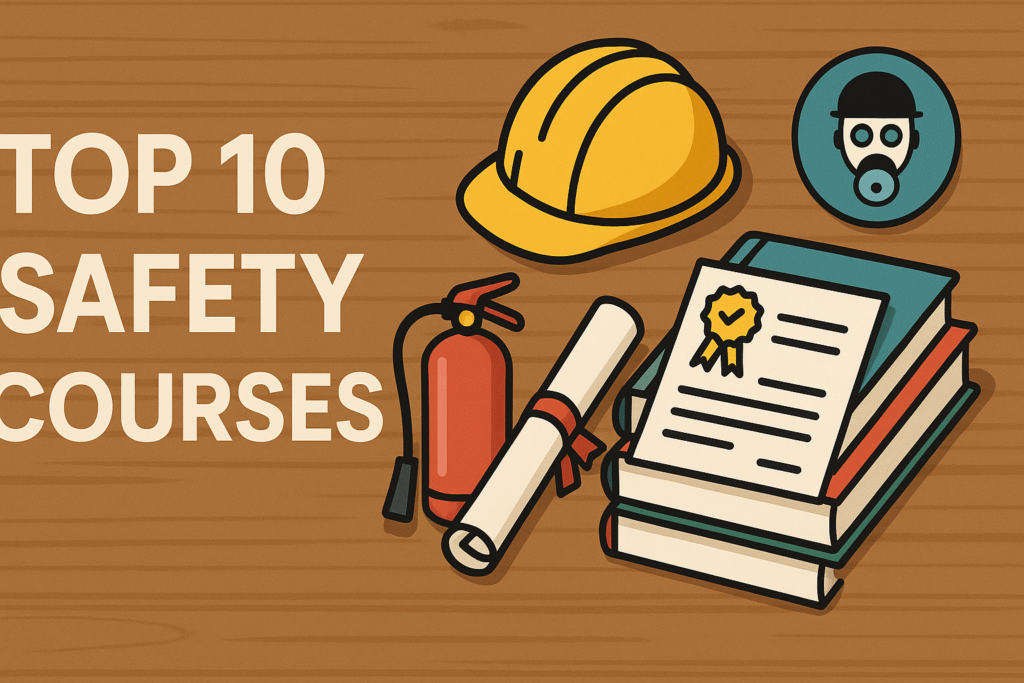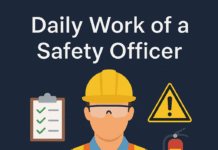
Top 10 Safety Courses for a Successful Career in HSE
Top 10 Safety Courses: Health, Safety, and Environment (HSE) has become one of the fastest-growing career fields across the globe. From construction sites to oil & gas industries, every employer requires qualified safety professionals to prevent accidents, ensure compliance with regulations, and maintain a safe workplace.
However, many students and professionals are often confused about which safety course to pursue to build a successful career. With so many diplomas, certifications, and degree options available, it can be difficult to choose the right one.
In this guide, we will discuss the Top 10 Safety Courses that can help you start, build, and grow a career as a Safety Officer, HSE Engineer, or HSE Manager.
Why Safety Courses are Important?
A degree or diploma alone is not always enough to secure a job in safety. Employers look for specialized safety certifications that prove your knowledge of workplace hazards, risk management, and legal compliance. Completing the right courses will:
- Increase your chances of employment.
- Open international job opportunities.
- Provide knowledge about global standards like OSHA, ISO, and NEBOSH.
- Boost your salary and career growth prospects.
Top 10 Safety Courses
1. Diploma in Fire & Safety
- Duration: 1 year
- Eligibility: 10th/12th pass or any graduate
- Overview: Covers fire prevention, firefighting techniques, and safety management.
- Career Scope: Entry-level safety jobs in construction, factories, and fire safety departments.
2. Post Graduate Diploma in Industrial Safety (PGDIS)
- Duration: 1 year
- Eligibility: Any graduate, preferably in Science or Engineering
- Overview: Focuses on industrial safety, occupational health, and environmental safety.
- Career Scope: Safety officer roles in industries, with potential for supervisory positions.
3. Advanced Diploma in Industrial Safety (ADIS)
- Duration: 1 year
- Eligibility: Engineering diploma/degree or B.Sc (Science/Fire & Safety)
- Overview: Highly demanded qualification, covers risk assessment, industrial safety laws, and accident prevention.
- Career Scope: High demand in oil & gas, construction, and heavy industries.
4. Post Diploma in Industrial Safety (PDIS)
- Duration: 1 year
- Eligibility: B.E/B.Tech or B.Sc in Fire & Safety
- Overview: Designed for graduates to specialize in workplace safety and environmental management.
- Career Scope: Preferred for senior-level safety roles and government jobs.
5. NEBOSH International General Certificate (IGC)
- Duration: 10–15 days training + exam
- Eligibility: No strict eligibility (recommended for graduates)
- Overview: One of the most popular international safety certifications, recognized in 130+ countries.
- Career Scope: Opens global job opportunities, especially in the Middle East, Europe, and Africa.
6. NEBOSH International Diploma
- Duration: 12–24 months (self-study + exams)
- Eligibility: Ideally after completing NEBOSH IGC
- Overview: Advanced international qualification; equivalent to a university degree in safety.
- Career Scope: Essential for becoming an HSE Manager, Consultant, or Safety Auditor.
7. IOSH Managing Safely
- Duration: 4–5 days
- Eligibility: Open to all
- Overview: Introductory safety course offered by the Institution of Occupational Safety and Health (IOSH), UK.
- Career Scope: Best for beginners, supervisors, and managers to understand safety basics.
8. OSHA 30-Hour Course
- Duration: 30 hours of training
- Eligibility: Open to all
- Overview: US-based safety program focusing on workplace hazards, workers’ rights, and employer responsibilities.
- Career Scope: Highly valued in multinational companies and for projects under US clients.
9. B.Sc in Fire & Safety
- Duration: 3 years (Undergraduate Degree)
- Eligibility: 10+2 in Science stream
- Overview: Academic program covering fire engineering, safety management, and risk control.
- Career Scope: Strong foundation for students aiming for higher-level safety positions.
10. Certified Safety Professional (CSP)
- Duration: Depends on exam preparation
- Eligibility: Bachelor’s degree + safety experience
- Overview: Prestigious certification from the Board of Certified Safety Professionals (BCSP), USA.
- Career Scope: High-level recognition; opens international opportunities with premium salary packages.
Which Course is Right for You?
Choosing the right course depends on your current qualification, career goals, and job location preference:
- For Freshers: Start with Diploma in Fire & Safety or IOSH Managing Safely.
- For Graduates: Go for ADIS, PGDIS, or NEBOSH IGC.
- For International Jobs: NEBOSH IGC, NEBOSH Diploma, OSHA 30 Hours, CSP are highly recommended.
- For Long-Term Careers: B.Sc in Fire & Safety followed by PDIS or NEBOSH Diploma ensures strong growth.
External Link: BCSP official site
Internal Link: How to Become a Safety Officer After Graduation?
Role and Responsibility of a Safety Officer
25+ Basic HSE Interview Questions for Freshers – Simple Answers to Get You Hired
Top 50 General Safety Officer Interview Questions and Answers – Complete Guide
Is Safety Officer a Good Career Option?
Conclusion
The HSE field is growing rapidly, and employers give high preference to candidates with recognized safety certifications. From entry-level diplomas to advanced certifications like NEBOSH Diploma or CSP, these qualifications help you climb the career ladder and secure opportunities worldwide.
If you are serious about a career in safety, choose the right course based on your qualification level and career goals, gain practical site experience, and continue upgrading your skills. With the right combination of education and certifications, you can become a successful Safety Officer, HSE Engineer, or even an HSE Manager in the future.
























